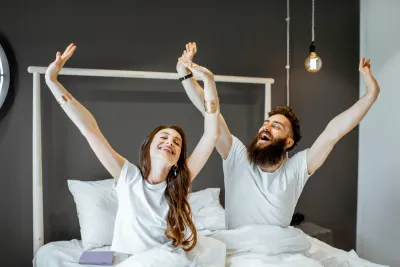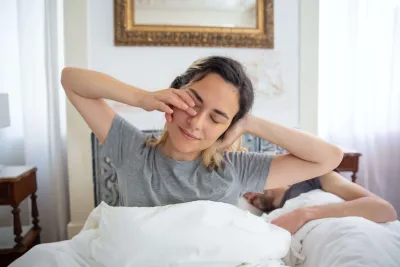11 Effective Tips on How to Get More REM Sleep
Ana Marie Schick: Resident Sleep Expert and Certified Health Coach • Sep 24, 2024

Key Takeaways
REM sleep is critical for memory, mood, and mental clarity—and small, consistent habits can help you spend more time in this essential sleep stage.
- REM sleep supports learning, emotional balance, and cognitive performance, making it a core pillar of restorative sleep.
- Keeping a consistent sleep and wake schedule helps your brain cycle into REM more reliably each night.
- Lifestyle factors like caffeine, alcohol, nicotine, and late-night screen use can reduce REM sleep and fragment sleep cycles.
- A cool, dark, and quiet bedroom creates the ideal conditions for longer, uninterrupted REM periods.
- Practices such as meditation, earlier-day exercise, and a structured wind-down routine can cue the brain for deeper sleep and more REM.
Achieving excellent-quality sleep is a personal experience. You don’t need to pour through extensive scientific research just to sleep soundly through the night. We all need to look into and develop our own sleep recipe.
Common life and work stressors, sudden changes (such as job loss), or medical problems often disrupt healthy sleep habits. The emotional effects of these stressors are, in fact, sorted out during the REM sleep stage.
Therefore, if your sleep quality is suffering, then most likely, the amount of time you spend in REM sleep could also be suffering. Luckily, there are things you can do to improve your REM sleep.
Why is REM Sleep Important?
Rapid eye movement sleep (REM) is for our overall well-being. It impacts mental processes such as memory consolidation and emotional processing. Why do we need more REM sleep? It helps us process emotions, form memories, and sort through information taken in throughout the day.
Think of it as your brain’s nightly reboot.
How to Get More REM Sleep Naturally
Take a look at the following tips below and find out which one works best for you. It might take a bit of trial and error, but with the right approach, you'll be on your way to more restful and rejuvenating REM sleep!
Consistent Sleep Schedule
Sticking to a consistent sleep schedule. This means going to bed and waking up at the same time every day—yes, this even includes on the weekends, too.
A regular sleep schedule is one of the best practices for regulating your body's internal clock, also known as the circadian rhythm, which controls your sleep-wake cycle.
Once your body gets used to a regular routine, it begins to anticipate sleep and wake times, making it easier to fall asleep and wake up feeling refreshed. It can take some time, but trust me, it's worth it!
Sticking to a regular sleep schedule paves the way for more stable sleep patterns and improved REM sleep. This sleep phase is important for dreaming and cognitive function and is a key player in overall sleep quality. Don't underestimate the power of a sleep schedule. It can greatly improve your chances of getting more REM sleep.
Related Blog: Tips on How to Reset and Fix Your Seep Schedule
Boost Your REM Sleep with Our Bed Cooling Systems
Improve your sleep experience with our bed cooling systems and get deeper REM sleep. Say goodbye to restless nights and hello to rejuvenating rest. Start sleeping better today!

Technology to Improve REM Sleep
Today, more people are learning about the benefits of a wide range of sleep technologies. Over the last few years, use has increased for smart mattresses, cooling mattress toppers, and wearable and non-wearable sleep trackers.
A recent survey by the American Academy of Sleep Medicine in 2023 found that over one-third of Americans (35%) have used an electronic sleep-tracking device. Of those who tried one, the majority (77%) found it helpful, and many (68%) reported changing their behavior based on their insights. [1]
At Sleepme, we offer various solutions to assist you in achieving better and more restorative sleep, including REM sleep.
Non-Wearable Sleep Tracker
Some are slim and can be placed under your bed sheet, eliminating the need to wear them like traditional wearable. It monitors your sleep patterns without any inconvenience.
They often track sleep stages, heart rate variability, and resting heart rate, providing valuable insights into your sleep quality. With this information, you can identify areas for improvement and personalize your sleep routine for optimal REM sleep.
Chilipad Bed Cooling Systems
Did you know a cool bedroom temperature can significantly improve sleep quality? Unlike a fan, our Chilipad Dock Pro, the best cooling mattress topper, and the Cube, a temperature controlled mattress pad which uses water circulation to create a personalized, comfortable cooling experience for your bed.
Related: Learn About Our Bed Cooling Systems
Our mattress topper slips right onto your bed with no hassle. You can easily control the temperature to create your perfect sleep climate.
Boost your sleeping experience with our ultra-comfy, active-cooling mattress topper. It fits over your existing mattress and under your fitted sheet. Schedule automated temperature adjustments throughout the night to keep your bed at the perfect temperature for optimal sleep.
Sound Machines
Sound machines can create a calming atmosphere that drowns out distractions. As a result, this may lead to a more rejuvenating night's sleep and potentially increase REM sleep.
Sleep Apps
Sleep apps can be your personal relaxation coach. Guided meditations, soothing stories, and relaxation techniques help you unwind and prepare for a good night's sleep.
With the help of these technologies, you can optimize your sleep conditions, which will lead to better sleep overall, which is our goal!
Alcohol Consumption
A lot of people think that having a drink can help them unwind and fall asleep faster. Although alcohol makes you feel sleepy at first, it can disrupt your overall sleep quality. Instead of providing restful sleep, alcohol tends to cause more frequent awakenings throughout the night, leaving you feeling less refreshed and energized in the morning.
One of the significant ways alcohol impacts your sleep is by interfering with REM sleep. Alcohol consumption can lead to more frequent wake-ups and lighter sleep during the second part of the night, which is when you’re most likely to experience the most REM sleep.
This reduction in REM sleep may be linked to the way alcohol alters brain chemistry. Additionally, alcohol consumption leads to an increase in light sleep while reducing the amount of REM sleep.
Did You Know: If you have sleep apnea, drinking alcohol before bed can make the condition worse.
Even drinking small amounts of alcohol can disrupt your sleep, and if you drink regularly, it can significantly reduce the amount of REM sleep you get. [2]
Related Blog: How Does Alcohol Affect Sleep

Nightly Bedtime Routine
Establishing a nightly bedtime routine can be an effective way to improve your REM sleep. A consistent routine signals your body that it’s time to wind down and prepare for sleep.
Additionally, NREM (Non-REM) sleep, which occurs when the eyes are mostly still, plays a great role in physical restoration and brain function, contributing greatly to overall sleep quality.
Did You Know: Sleep disorders like sleep apnea can contribute to disruptions in REM sleep.
How can you get started? Simple activities like meditating, reading a book or magazine, listening to calming music, or taking a warm bath can help your body relax and transition into sleep mode. Try practicing yoga nidra, a form of guided meditation that promotes deep relaxation.
This can seem overwhelming, but try some relaxation techniques and see what works best for you. Focus on activities that will calm your mind and body, making it easier to fall asleep.
Regular Daily Exercise
One of my favorites! It’s time to get moving! Regular exercise, ranging between 20 to 30 minutes a day, can be helpful. Research shows that regular exercise is a fantastic way to boost your REM sleep. When you work out, your body works hard, and when it’s time to rest, it craves recovery. [3]
This increased need for restoration can lead to deeper and more restful sleep, including more time spent in the important rapid eye movement (REM) stage.
Bonus: Exercise also helps reduce stress and anxiety, which are common culprits of sleep disturbances.
Exercise is important, but so is the timing. While moderate or low-intensity exercise in the evening can encourage sleep quality, intense workouts may raise your core body temperature, making it difficult to unwind and fall asleep and, ultimately, disrupt your sleep-wake cycle, which can also lead to less REM sleep.
Sleep Environment
Your bedroom should be your sleep sanctuary. Keep it dark, quiet, and cool. Think of it as your personal relaxation zone. Incorporating good sleep hygiene practices, such as maintaining a consistent sleep schedule and creating a restful environment, can significantly improve the quality of your sleep.
It can be challenging, but banish those distracting screens! The blue light from phones, TVs, and computers can trick your brain into thinking it’s daytime, making it harder to fall asleep. Plus, a cooler room feels more like bedtime, helping you drift off to sleep more easily.
Tip: If you struggle to avoid using your phone before bed, consider charging it outside your bedroom or further away in your room, making it less accessible.
Total darkness is also important. The smallest amount of light can disrupt your sleep. A great way to eliminate any light is to use blackout curtains or a sleep mask if it doesn’t bother you.
Creating the perfect sleep environment can help you achieve more REM sleep.
Limit Smoking and Caffeine
Are you looking to get more rejuvenating, deep, dream-filled REM sleep? To help you achieve this, try reducing your intake of nicotine and caffeine, especially in the afternoon and evening.
Related Blog: What Is REM Sleep and Why Is It Important
Nicotine, found in cigarettes, is a stimulant that can keep your body alert, making it harder to relax and fall asleep. Caffeine, which is found in a variety of foods and drinks, including coffee, tea, soda, and even chocolate, can stay in your system for several hours, disrupting your ability to wind down at night.
Did You Know caffeine can take a while to leave your body? It's true! It peaks about an hour after you drink it and can stick around for several hours. Even six hours later, half of it is still there! It may take ten hours for it to disappear completely. [4]
If you're having trouble sleeping, try cutting back on caffeine and only have it in the morning.
It's helpful to reduce or avoid smoking and caffeine in the afternoon and evening. This gives your body a better opportunity to unwind naturally.
Cool Room Temperature
A cooler bedroom can work wonders for your overall sleep. When it's time to wind down, your body naturally cools down, so a colder room can help you fall asleep faster and enjoy deeper sleep.
Keeping a cooler environment can facilitate this natural process, making it easier to fall asleep and remain asleep all night.
If your bedroom is too warm, it can interfere with your body’s ability to regulate its temperature, leading to restless sleep and ultimately less time spent in REM sleep.
By keeping your room at an optimal cool temperature, usually between 60-72°F, you can create a more comfortable sleeping environment. This helps promote deeper, uninterrupted sleep, allowing you to spend more time cycling through all the stages of sleep, including the important REM stage.
Related Blog: Why Do I Get So Hot When I Sleep
Get Out of Your Bed
Getting out of bed when you can’t sleep can help you sleep better. It might sound counterintuitive, but spending too much time awake in bed can make it harder to fall asleep.
If you find yourself lying awake for more than 20 minutes, try getting up and doing something relaxing until you feel sleepy again. This can help break the cycle of frustration and improve your overall sleep quality, which includes REM sleep.

Mindful Breathing Exercises
Often overlooked, but taking a few minutes to focus on your breath before bed can do wonders for your sleep. Slow, deep breathing exercises help calm your mind and body, which is exactly what you need to wind down. It's like hitting the reset button on your stress levels.
When you're relaxed and focused on your breath, it's easier to fall asleep and enjoy more restful deep sleep, including REM sleep.
Also, soothing sounds and sleep stories can also help you relax, and they're not just for kids; adults can benefit from them, too. These stories can assist you in transitioning from the chaos of daily life to a state of calm and tranquility.
Diet for REM Sleep
Diet is often mentioned as a factor in increasing REM sleep. Can it help? Absolutely. Diet has a significant impact on improving your REM sleep. What you eat can affect your sleep quality, so be mindful of your food choices.
Certain medications can suppress REM sleep, which can impact your sleep cycle and quality of life. If this is a concern, consult your doctor about alternatives.
- Foods rich in certain nutrients, like tryptophan, can promote better sleep.
- On the other hand, heavy meals or sugary snacks close to bedtime can disrupt your sleep.
- A balanced diet with plenty of fruits, vegetables, and lean proteins can contribute to a healthier sleep pattern, including how much REM sleep you get.
Final Thought
Achieving optimal REM sleep is an ongoing process, not a one-time goal. Although there’s no universal remedy, integrating these approaches can greatly improve the quality of your total sleep.
Understanding the sleep cycle and its impact on achieving restorative sleep is important. Consistency is important. Sticking to a regular sleep schedule, creating a peaceful sleep environment, and making thoughtful lifestyle choices will pave the way for a more restorative sleep.
It’s okay to experiment and find what works best for you. If you’re struggling with persistent sleep issues, consider consulting with your primary doctor for personalized guidance.
How to Get More REM Sleep FAQs
What Are the Symptoms of Lack of REM Sleep?
Symptoms of a lack of REM sleep can include:
- Difficulty concentrating
- Mood swings
- Memory problems
- Increased irritability
- and feeling tired even after a full night's sleep.
How Can I Track My REM Sleep?
With today's technology, you can easily track your REM sleep. Why is it important to monitor it? Tracking your REM sleep can provide valuable insights into your overall sleep quality and help you identify patterns affecting your sleep. You can get estimates using various methods, including sleepme's non-wearable sleep tracker and other options such as sleep apps and wearable sleep trackers.
Why Am I Having Trouble Getting Enough REM Sleep?
You might not be getting enough REM sleep for a few reasons. These could include underlying health issues like sleep disorders, using substances that interfere with sleep, or taking medications that affect your sleep patterns.
Don't hesitate to get in touch with your primary doctor if you have any concerns about your sleep.
How Do I Increase My REM Sleep?
Here are some helpful strategies to enhance your REM sleep:
- Stick to a consistent sleep schedule
- Create a relaxing bedtime routine
- Optimize your sleep environment
- Limit caffeine and alcohol
- Manage stress
- Avoid heavy meals before bed
Peer-Reviewed Research References
-
Celmer, L.
One in Three Americans Have Used Electronic Sleep Trackers.
American Academy of Sleep Medicine, November 15, 2023.
Study Type: National Survey Report
Key Finding: Approximately one-third of Americans report using electronic sleep trackers, with many stating the data influenced changes in sleep habits, routines, and health behaviors.
View Resource
Source URL: https://aasm.org/one-in-three-americans-have-used-electronic-sleep-trackers-leading-to-changed-behavior-for-many
-
Colrain, I. M., Nicholas, C. L., & Baker, F. C.
Alcohol and the Sleeping Brain.
Handbook of Clinical Neurology, 2014.
Study Type: Neurophysiological Review
Key Finding: Alcohol disrupts normal sleep architecture by reducing REM sleep, increasing nighttime awakenings, and impairing brain recovery processes despite its sedative effects.
View Study
Source URL: https://pubmed.ncbi.nlm.nih.gov/25307588/
-
Dolezal, B. A., et al.
Interrelationship Between Sleep and Exercise: A Systematic Review.
Advances in Preventive Medicine, 2017.
Study Type: Systematic Review
Key Finding: Sleep and exercise influence each other bidirectionally—regular physical activity improves sleep quality, while poor sleep can negatively affect exercise performance and recovery.
View Study
Source URL: https://pubmed.ncbi.nlm.nih.gov/28458924/
-
WebMD Editorial Contributors.
What to Know About How Long Caffeine Lasts.
WebMD, 2021.
Study Type: Medical Education Resource
Key Finding: Caffeine can remain active in the body for six hours or longer, potentially delaying sleep onset and reducing sleep quality when consumed later in the day.
View Resource
Source URL: https://www.webmd.com/diet/how-long-caffeine-lasts









